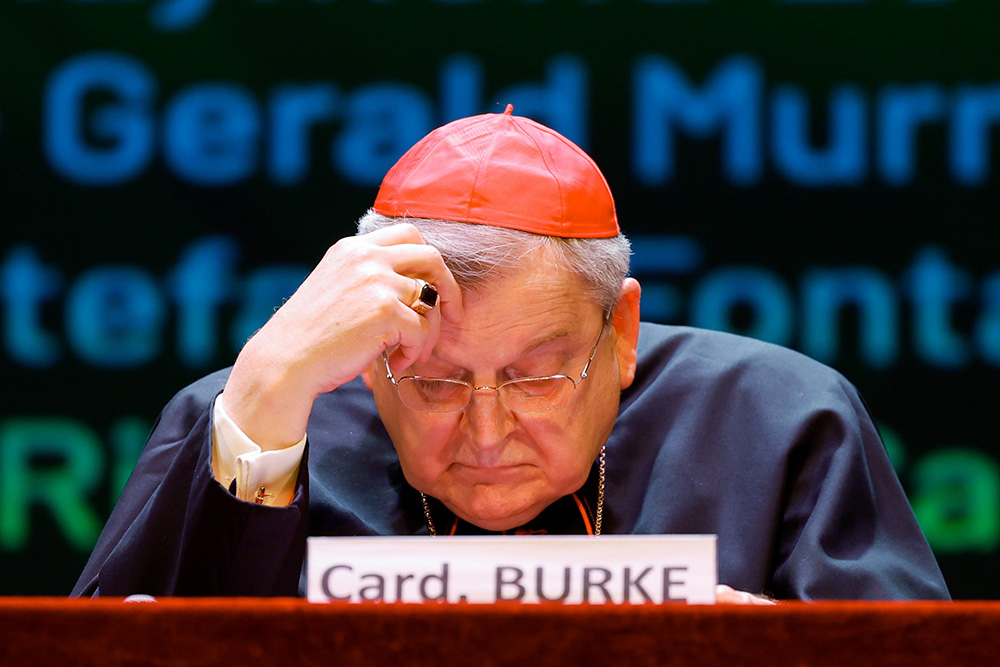
U.S. Cardinal Raymond Burke follows the written text of another speaker at the conference "The Synodal Babel" at the Ghione Theater in Rome Oct. 3. (CNS/Lola Gomez)
According to LifeSiteNews, Pope Francis "intends to strip Raymond Cardinal Burke of his flat and his salary."
The venerable Associated Press opened its story, "Pope Francis has decided to punish one of his highest-ranking critics, Cardinal Raymond Burke, by revoking his right to a subsidized Vatican apartment and salary in the second such radical action against a conservative American prelate this month, according to two people briefed on the measures."
At The New York Times, the headline for Ross Douthat's column claims the pope is trying to "settle accounts" and Douthat also uses the verb "stripped" to describe Pope Francis' actions.
Save the tears. Burke is hardly going to be walking around Rome naked. Nor is he exactly homeless. The cardinal is apparently living at the Shrine of Our Lady of Guadalupe in LaCrosse, Wisconsin, which he began building when he was the bishop in that diocese. If you go to its website, a pop-up solicitation for your email address announces "Stay in touch with the Shrine and with Cardinal Burke." The cardinal is scheduled to say "Solemn Pontifical High Mass" at the shrine on Dec. 16. That same day, pilgrims from the diocese of New Ulm, Minnesota, will get to greet the cardinal after the Mass. So, his dance card is pretty full.
As for punishment, Burke is not being put in a pillory in front of the Dicastery for the Doctrine of the Faith. There are no shackles.
When Cardinal Angelo Becciu faced allegations of financial wrongdoing, he renounced the rights of the cardinalate and is currently on trial for embezzlement. Francis has not stripped Burke of his right to vote in conclave. He can process around in his red cappa magna as often as he wishes.
What he can't do is expect the pope he is attacking to subsidize him.
The Curia and the cardinalate exist to support the pope in the exercise of his office. It makes sense that when certain prelates — and now religious men and women and even laity — retire from many years of service to the pope, they might want to stay on in Rome. They may not have lived in their home country for decades. I know of one instance recently when a newly retired archbishop was given a few tasks by the pope, so he is staying on in Rome to complete them. It is not inconceivable that a person has enormous and useful institutional memory that a new prefect or secretary might want and so the person is kept around for consultation. None of that applies to Burke.
Advertisement
Apart from the overwrought verbs, the more pernicious thing about the reporting on Burke cited above is the way it links this removal of a perk to the removal of Bishop Joseph Strickland from the pastoral governance of the Diocese of Tyler, Texas. The linkage makes it seem like the problem is Francis, when the outrageous behavior is coming from the two American prelates.
To be clear, there is a lot we do not know about both cases. None of us has seen the communication between the Holy See and Burke or Strickland, as I explained in a recent interview. The nuncio has seen it all, and he is not talking.
What we know is that Rome is always reluctant to remove a bishop from a diocese unless an apostolic visitation concludes it is impossible for him to continue. Bishops quietly resign one post, or are shuffled to another, for all sorts of reasons, but none of those reasons are superficial. In the case of a diocesan bishop, many, many relationships will be profoundly affected by such a removal, so it is never done lightly.
In this case, we know there was an apostolic visitation of the diocese and we know that there were allegations of severe mismanagement, as my colleague Brian Fraga reported. None of us knows if the pope would have left Strickland in his post if the diocese was running like a Swiss clock. But we do know that was not the case.
We know something else, too: In the age of social media, both Burke and Strickland will be able to continue to stir up trouble and foment disunity within the church.
LifeSiteNews and "Pints with Aquinas" may be fringe outlets but Strickland did an interview with EWTN's Raymond Arroyo after his removal from office, and EWTN reaches millions of Catholics. Arroyo also did an interview with Burke as the synod was getting started at the beginning of October. As long as they are willing to cause trouble, EWTN, under its current leadership, will be only too willing to offer them a megaphone.
The opposition to Pope Francis is small, it is mostly confined to the Anglosphere, it is well-funded, and it is not going away anytime soon. Burke and Strickland are leading sources of "Francis Derangement Syndrome," but their cases are vastly different. Lumping the two situations together misunderstands what was done in each.








